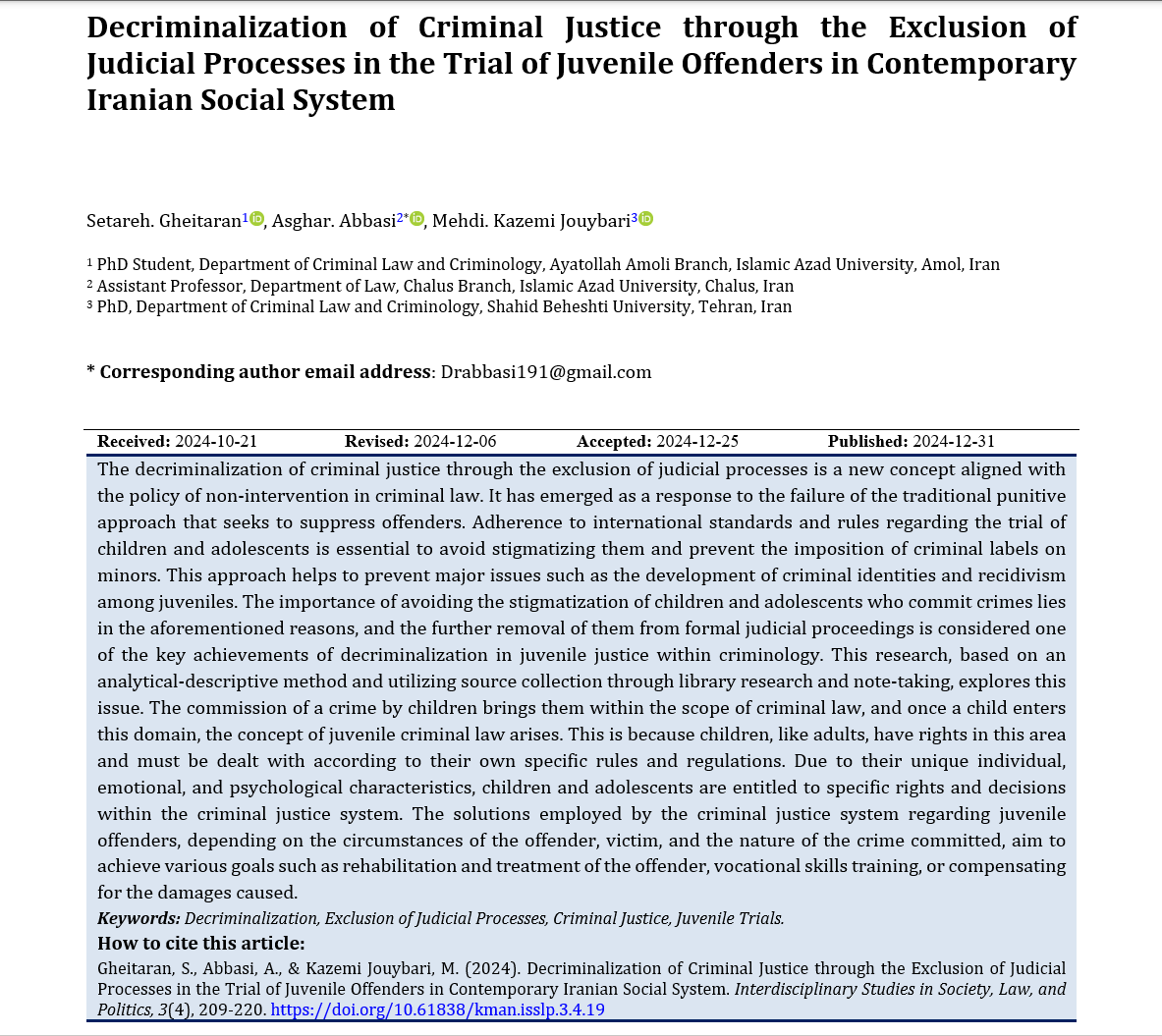Decriminalization of Criminal Justice through the Exclusion of Judicial Processes in the Trial of Juvenile Offenders in Contemporary Iranian Social System
Keywords:
Decriminalization, Exclusion of Judicial Processes, Criminal Justice, Juvenile TrialsAbstract
The decriminalization of criminal justice through the exclusion of judicial processes is a new concept aligned with the policy of non-intervention in criminal law. It has emerged as a response to the failure of the traditional punitive approach that seeks to suppress offenders. Adherence to international standards and rules regarding the trial of children and adolescents is essential to avoid stigmatizing them and prevent the imposition of criminal labels on minors. This approach helps to prevent major issues such as the development of criminal identities and recidivism among juveniles. The importance of avoiding the stigmatization of children and adolescents who commit crimes lies in the aforementioned reasons, and the further removal of them from formal judicial proceedings is considered one of the key achievements of decriminalization in juvenile justice within criminology. This research, based on an analytical-descriptive method and utilizing source collection through library research and note-taking, explores this issue. The commission of a crime by children brings them within the scope of criminal law, and once a child enters this domain, the concept of juvenile criminal law arises. This is because children, like adults, have rights in this area and must be dealt with according to their own specific rules and regulations. Due to their unique individual, emotional, and psychological characteristics, children and adolescents are entitled to specific rights and decisions within the criminal justice system. The solutions employed by the criminal justice system regarding juvenile offenders, depending on the circumstances of the offender, victim, and the nature of the crime committed, aim to achieve various goals such as rehabilitation and treatment of the offender, vocational skills training, or compensating for the damages caused.
Downloads
References
Abachi, M. (2021). Juvenile Criminal Law, 2nd Edition. Majd Publications.
Ansell, M. (2012). Social Defense. Ganji Danesh Publications.
Aqa'i Janat Makani, H. (2012). General Criminal Law, Volume Two, 2nd Edition. Jungle Publications.
Ardabili, M. A. (2023). General Criminal Law, Volumes 1 and 2. Mizan Legal Foundation Publications.
Ashouri, M. (2016). Criminal Procedure Law, Volume One, 19th Edition. SAMT Publications.
Ashouri, M. (2019). Alternatives to Prison or Intermediate Punishments. Jahesh Publications.
Basari, A. A. (2008). Criminal Justice Policy for Children and Adolescents in Domestic Law and International Documents. Khorsandi Publications.
Delmas-Marty, M., & Abrandabadi, A. H. (2016). Major Systems of Criminal Justice Policy. Mizan Publications.
Ghaffari, M. (2005). Decriminalization in Juvenile Justice Tehran Central Branch, Islamic Azad University.
Hezber al-Sadati, H., & Habibzadeh, M. J. (2014). Social Justice and Criminal Justice: Separation or Connection? Criminal Law Teachings(8).
Jadidi Kardi, E. (2008). Decriminalization in Juvenile Justice for Offenders Naragh Branch, Islamic Azad University.
Kordalivand, R. (2003). Juvenile Justice in Iranian Law Imam Sadiq University.
Mahmoudi Janki, F. (2008). The Theory of Deterrence in Punishment. Quarterly Journal of Law(2).
Najafi Abrandabadi, A. H., & Beki, H. (2018). Encyclopedia of Criminology. Ganji Danesh Publications.
Norbaha, R. (2008). Was the Death Penalty or Not?
Rutherford, A. (2001). Criminal Justice Choices: What Is Criminal Justice for?
Sadati, S. M. M., Sadati, S. M. J., & Mohammadi Karachi, B. (2020). Mediation in Imami Jurisprudence and Iranian Criminal Law. Quarterly Journal of Islamic Jurisprudence Studies and Legal Foundations, 14(41).
Winter, R. (2019). Report on Workshops on Juvenile Justice Training. United Nations Publications.






